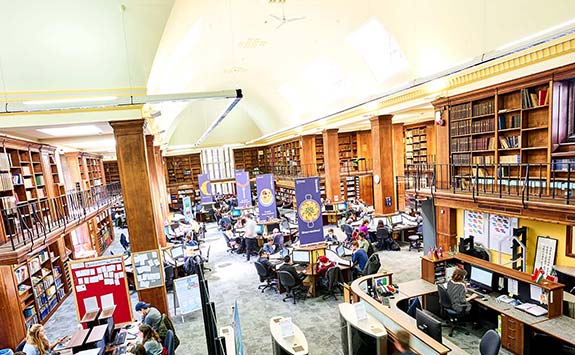Linguistics
Explore and understand the structure and history of the English language.
Stages 2 and 3 then give you the chance to extend your understanding, with various options introducing variations and varieties of English.
You also get to choose from a range of special topics, such as:
- semantics
- pragmatics
- the sociology of language
- the psychology of language
Offered by the School of English Literature, Language and Linguistics.
You have the chance to socialise with other students via the lively and active English Society

Stage 1
Select the module code for specific module information including the module summary and aims, knowledge and skills you'll gain, and the module leader.
Students taking three subjects in Stage 1 must take the following 40 credits:
| Module Code | Module Title | Credit Value | Semester |
|---|---|---|---|
| SEL1027 | Introduction to the Structure of Language 1: Phonetics, Phonology and Morphology | 20 | 1 |
| SEL1028 |
Introduction to the Structure of Language 2: Syntax, Semantics and Pragmatics (Pre-requisite SEL1027) |
20 | 2 |
Candidates taking two subjects in Stage 1 must take the above 40 credits, and either:
| Module Code | Module Title | Credit Value | Semester |
|---|---|---|---|
| SEL1008 | The Nature of Language | 20 | 1 |
| SEL1032 |
Dealing with Data (Pre-requisite SEL1027) |
20 | 2 |
Stage 2
You should select a minimum of 40 credits and maximum of 80 credits from the modules below.
Note: Students choosing Stage 2 modules in Linguistics should note that some modules in Stage 3 have pre-requisites, so you will need to check what Stage 3 modules you're interested in and plan your module selection appropriately. You will not be allowed to take a module at Stage 3 if you have not passed the appropriate pre-requisite module or modules at Stage 2.
| Module Code | Module Title | Credit Value | Semester |
|---|---|---|---|
| SEL2000 | Phonological Theory (Pre-requisites SEL1027) | 20 | 1 |
| SEL2089 | Syntactic Theory (Pre-requisite SEL1028) | 20 | 1 |
| SEL2091 | Sociolinguistics | 20 | 1 |
| SEL2212 | Early English: Texts, Patterns and Varieties (Pre-requisite SEL1032) | 20 | 2 |
| SEL2234 | Pragmatic Theory (Pre-requisites SEL1028) | 20 | 1 |
| SEL2235 | CHiLD: Current Hypotheses in Language Development (Pre-requisite SEL1027 and SEL1028) | 20 | 2 |
| SEL2237 | Introduction to Second Language Learning and Teaching (Pre-requisite SEL1028) | 20 | 1 |
Stage 3
You should select a minimum of 40 credits and maximum of 80 credits from the below table. You may opt to replace one of these modules by a module offered in Stage 2.
Many modules in Stage 3 contain pre-requisites so you will need to plan your module selection appropriately. You will not be allowed to take a module if you have not passed the appropriate pre-requisite module or modules.
| Module Code | Module Title | Credit Value | Semester |
|---|---|---|---|
| SEL3326 | Short-form Dissertation 1: English Language and Linguistics | 20 | 1 |
| SEL3327 | Short-form Dissertation 2: English Language and Linguistics | 20 | 2 |
| SEL3413 | Language and Ageing (Pre-requisite SEL1032) (Capped at 60) | 20 | 1 |
| SEL3431 | Laboratory Phonology (Pre-requisites SEL1027 and SEL2000) (Capped at 60) | 20 | 2 |
| SEL3441 | Medieval and Early Modern Meaning: English Historical Semantics (Pre-requisite SEL1028) (Capped at 60) | 20 | 2 |
| SEL3448 | Current Issues in Linguistics (contact Gabriel Martinez Vera if interested in studying) (Capped at 40) | 20 | 1 |
| SEL3454 | New Words in English | 20 | 1 |
| HSS3500* | Combined Honours Final Year Project | 20 | 1&2 |
| HSS3099* | Combined Honours Final Year Project | 40 | 1&2 |
*Undertake an in-depth, independent research project with flexibility to select a topic related to one or all your subject areas, and the option to deliver a written or creative output. Supervisors are assigned from the Combined Honours academic team, and you can choose which subject(s) you want the credits to go towards.
Get in touch
If you have any questions about choosing this subject as part of your Combined Honours degree, contact us and we'll be more than happy to help.
Subject adviser
Dr Mary Robinson - School of English Literature, Language & Linguistics
